Digiday Research: What marketers are moving in-house in 5 charts

Marketers taking work in-house isn’t a new phenomenon but it’s a growing trend — one that has pros and cons — that’s affecting agencies at a time when they’re feeling the pressure of more project work and fewer agency-of-record assignments. Marketers aren’t simply taking work in-house to stop working with agencies but to have a greater hand in how their marketing is handled and to be more nimble when that’s required.
Using Digiday Research, we took a look at what exactly marketers are taking on, and why.
Why brands take marketing in-house
Last November, 38% of 214 brand marketers surveyed by Digiday said they were taking their business in-house because it gave them increased control. Brand marketers ranking control as the number one reason they would take their business in-house isn’t surprising. In recent years, marketers like Procter & Gamble, the world’s largest marketer, have tried to rein in their use of agencies. P&G chief brand officer Marc Prichard even promised to “take back control” from agencies. This need to regain control follows a perception that agencies weren’t being forthright or transparent with clients in terms of fees and taking advantage.
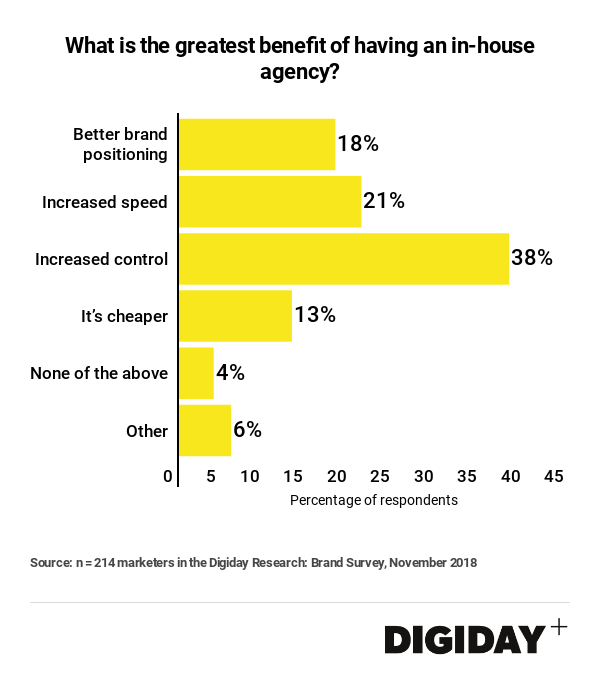
Having control over marketing isn’t just about monitoring where the dollars are going. As marketing has shifted to require marketers to have an always-on presence, especially on social where they may need to quickly reply to something related to their brand that has gone viral, it’s helpful for marketers to have talent in-house that can do things on the fly rather than dealing with a back-and-forth with agencies.
What’s going in-house
Mailchimp, the online marketing company best-known for podcast advertising, ended its relationship with its creative agency, Droga5, during the first quarter of 2019. As previously reported by Digiday, Mailchimp is now producing more of its marketing content in-house and the company isn’t alone. Marketers like the NHL, Getty Images and Electrolux have all moved some duties that were previously handled by agencies in-house. This past November, marketers surveyed told Digiday that they were most likely to bring programmatic ad buying in-house with 37% surveyed anticipating that move in 2019. At Digiday’s Programmatic Buying Summit this past May, Bayer shared that the company had saved at least $10 million after moving programmatic in-house.
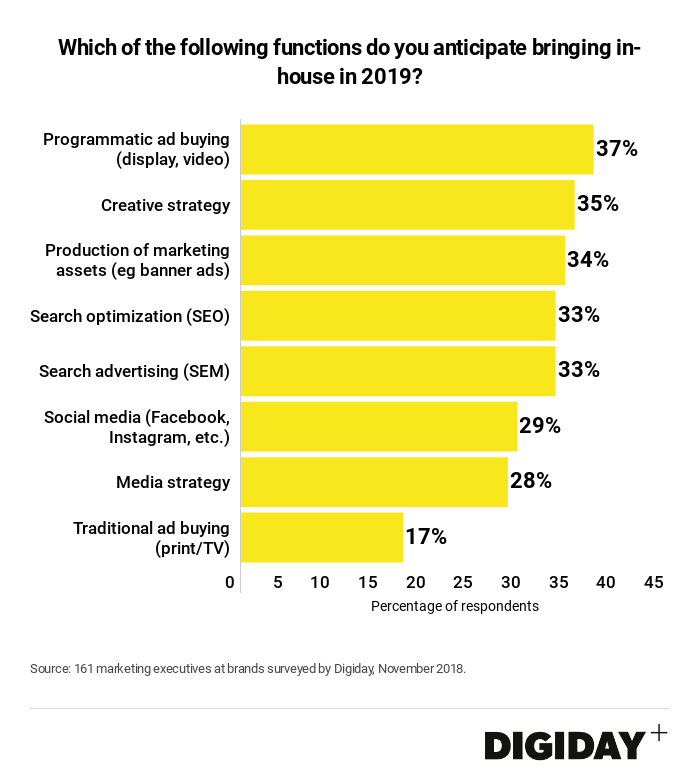
It’s not just about savings. Working with in-house talent on various marketing functions can be easier and less frustrating than trying to work with a full-service agency’s various teams, marketing specialist Peter Weingard told Digiday in an email.
Still working with agencies
That’s not to say marketers opting to go in-house are planning to leave out agencies altogether. Marketers will still typically rely on agencies for various services with agencies that handle creative production being the most popular for marketers to still partner with. Per Digiday research, 61% of marketers who have in-house teams will still partner with agencies for creative production. That said, even as marketers still work with agencies, marketers taking some services in-house will naturally cut into how much work there is available for agencies.
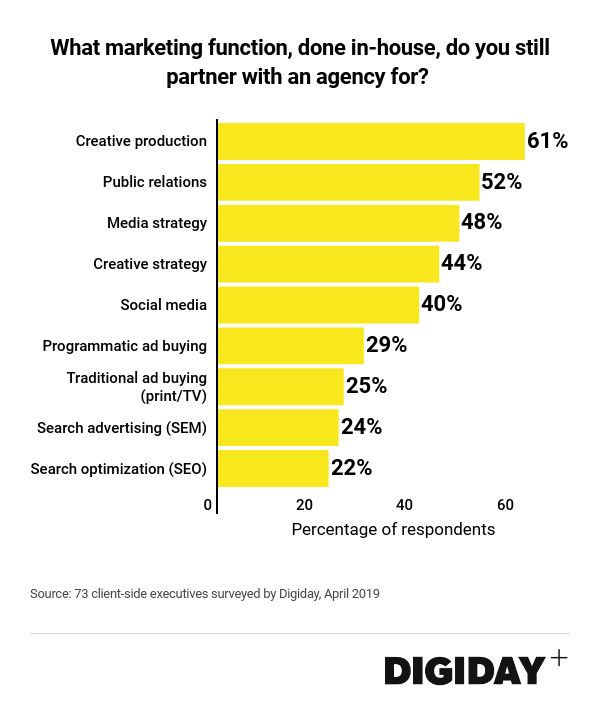
Help to move things in-house
Setting up an in-house team doesn’t happen overnight. While a majority of marketers, or 71%, said they aren’t paying a firm to help them move services in-house, others have hired industry experts, agencies that specialize in in-housing, consultants or even the agency they previously worked with to help smooth the transition to in-housing.
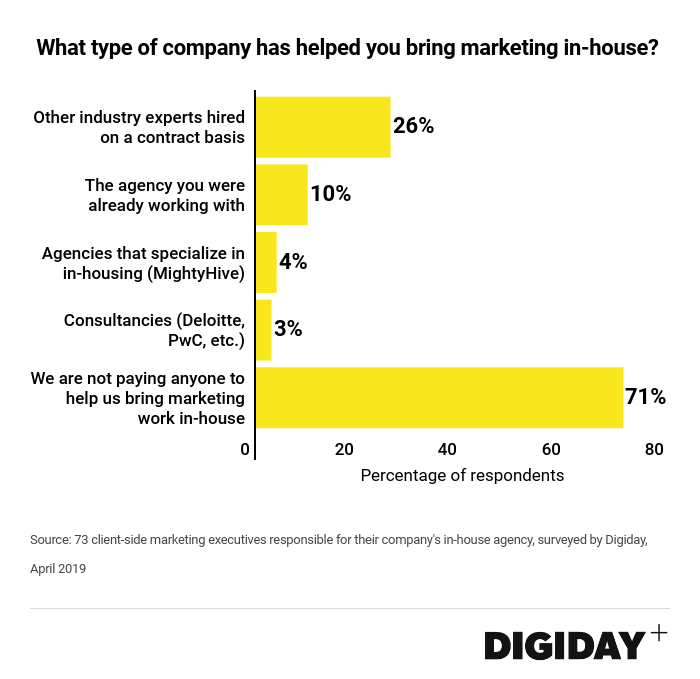
Challenges of in-housing
The difficulty of getting an in-house team together will vary by the services agencies bring in-house. For 62% of marketers surveyed by Digiday, hiring talent is the biggest challenge when it comes to moving certain marketing services in-house. When it comes to finding talent for in-house teams, programmatic talent can be particularly tricky for agencies to find. Of course, once that talent is part of an in-house team it will take time to set up whatever marketing programs an agency previously ran and to get that in-house talent up to speed. How long that takes will depend on the marketing programs brought in-house and the level of the talent brands are able to attract.
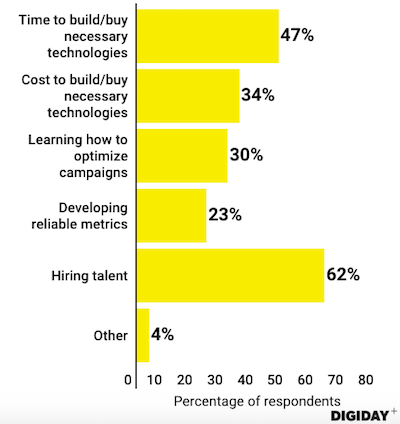
More in Marketing

WTF are tokens?
When someone sends a prompt or receives a response, the system breaks language into small segments. These fragments are tokens.

AI is changing how retailers select tech partners
The quick rise of artificial intelligence-powered tools has reshaped retailers’ process of selecting technology partners for anything from marketing to supply chain to merchandising.

YouTube’s upmarket TV push still runs on mid-funnel DNA
YouTube is balancing wanting to be premium TV, the short-form powerhouse and a creator economy engine all at once.





